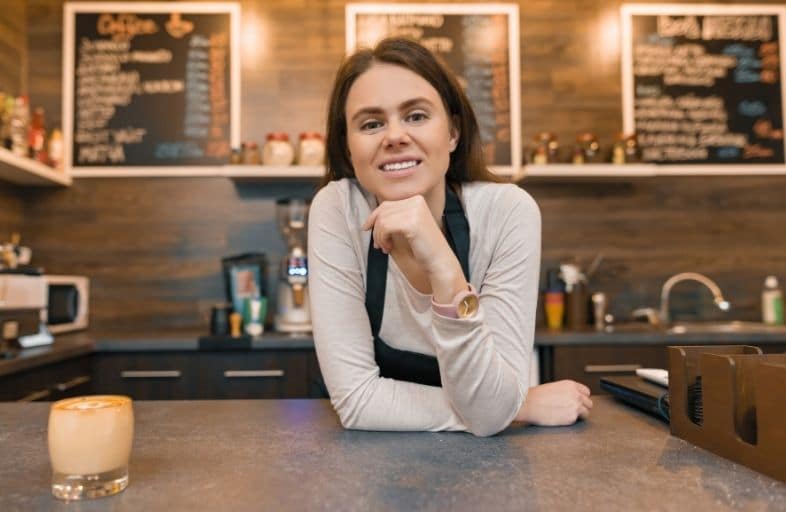
Any type of business can be a family business; however, there are three types of family business that are common in San Francisco among families choosing to start a company of their own. Here we’ll break down those types, highlight a handful of San Francisco family businesses in each category, and go over why these types of family business are so common in the Bay Area. Take a look.
1. Personal service
One of the most common types of family business is personal service. This is the pampering and personal grooming industry—places like nail and hair salons, barbershops, and massage parlors.
Notable San Francisco Family Owned Personal Service Businesses:
Rick’s Barbershop(Outer Richmond): Current owner Jervien Velasco took this shop over from his uncle Caesar Velasco in 2019. And Caesar had inherited it from his brother Rick, who opened the business in 1994. A true multi-generational legacy! They’re known for their classic service and $18 haircuts.
La Fleur Hair & Nail(Potrero Hill): La Fleur is a family and friend owned salon that treats its customers like family. They offer all their beautifying services in the Dogpatch district of Potrero Hill.
Simply Unique Nails (Castro): Simply Unique Nails—SUN for short!—is a family owned business that offers all the favorite mani, pedi, and spa services. And they even do group events.
2. Retail
Retail is the next most common out of the types of family business. It includes any store that sells general goods (besides food). This could be clothing, books, souvenirs, crafts, and pretty much anything else you can think of.
Notable San Francisco Family Owned Retail:
April in Paris (Clement St): April in Paris is a mother-daughter owned fine leather workshop. They’re known for their one-of-a-kind leather accessories.
Green Apple Books(Richmond/Inner Sunset): This local chain of bookstores was one of San Francisco’s first sanctioned Legacy Businesses. It’s owned by three partners looking to pass the business down to their children.
3. Food Industry
Food industry is the last of the big three types of family business. It covers both restaurants and packaged consumer goods.
Notable San Francisco Family Owned Restaurants:
Java Beach Cafe (Outer Sunset): Patrick and Buffy Maguire started Java Beach in 1993 to bring great coffee to their neighborhood. All their beans are locally roasted and sustainably sourced.
Toast Eatery (Noe Valley): Owned by family and perfect for family meals. Toast Eatery offers a classic diner experience.
Fresca Peruvian Kitchen (Inner Sunset): Fresca is our 2019 winner of the Gellert Family Business Awards in the hospitality category. Julio, Jose and Ivan Calvo Perez have been offering visitors a fresh yet traditional take on Peruvian cuisine for 32 years.
Notable San Francisco Family Owned Packaged Food Businesses:
Casa Sanchez Food (Hayward, CA): While just outside of San Francisco, we still think Casa Sanchez deserves a mention. They were the winners of our 2011 Gellert Family Business Award. Their authentic Mexican foods are in grocery stores throughout the San Francisco Bay Area.
Why do people choose these types of family business?
Why are these specific industries so popular with business families? There are a handful of common circumstances that lead families to choose personal service, retail, and food:
Immigrants building a business around their originating culture:
Many family businesses are run by immigrants or children of immigrants. Industries like personal service, retail, and food are often deeply influenced by world culture. These types of family businesses allow owners to easily express and share their culture of origin.
Jobs become businesses:
These industries, especially retail and food service, offer a lot of entry level jobs in the San Francisco area. Often, a family member will get training in one of these industries, discover that they enjoy the work or have a special talent, and opt to start their own business.
Low hassle (compared to other industries):
These types of family business don’t require a lot of complicated effort to start. Of course, starting any business is a big endeavor. However, in general, these businesses don’t require as complex business modelling as others.
San Francisco prohibition of chain stores:
San Francisco laws block chain stores from opening more than 11 sites in the city. This means that not all of the city’s retail spaces cater to large vendors, so there are many more small retail spaces available than there are in other large cities, creating opportunities to start small and grow big. This also means there’s less local big-name competition for these types of businesses.
Commercial condo-ization makes one property two:
San Francisco has a lot of commercial space on the first floor and apartments above. Often times, these spaces are bundled as a package deal. That means families can operate out of the floor below and live above. Or they can turn two businesses into one by renting out the living space. It’s a nice added bonus that makes starting a personal service, retail, or food business that much more tempting.
Legacy Businesses are protected in San Francisco:
Many of these types of family businesses have been around for decades. One reason for their longevity is that businesses in San Francisco who have been around for more than 30 years have the opportunity to apply for the Legacy Business Program, which offers special protected status and access to city grants.
Again, any business can be a family business. There’s no right or wrong industry to go into with your family. But for a variety of cultural, economic, and social reasons—personal service, retail, and food are many San Francisco business families’ top choices!